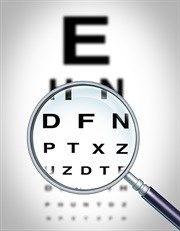Workplace Eye Wellness Awareness Month (March 2015) is a global initiative to increase awareness of the daily risks that can affect good vision in the work environment. Your eyes are exposed to various hazards in the workplace no matter where you work, as you deal with tools, equipment or simply work in front of a digital screen.

© freshidea - Fotolia.com
According to Andre Horn, a senior optometrist and managing director at Mellins i-Style, while stress can be emotionally draining, the body and your eyesight can also take a blow if you are not coping with pressure. Amongst others, causes of stress at work can include low salaries, excessive workloads, a lack of growth opportunities, work that is not challenging, little social support and limited control over important job-related decisions. If anxiety persists, it can be detrimental on your overall health and can increase your risk of heart disease, obesity, difficulty sleeping and depression.
Eye conditions that result from stress can include blepharospasms. In addition to stress, this condition, otherwise known as eyelid twitching, is caused by a lack of sleep and caffeine. Muscle spasms trigger a profuse twitching of the eyelids. Sometimes it only takes a few hours or days for the twitching action to subside. In some long-term cases, people have turned to Botox which a doctor injects near the eyelid to prevent the muscle from twitching.
Five ways to reduce stress at the office
- Keep a good posture: simply sitting up straight can influence your performance at work. Recent research, done by the Massachusetts Institute of Technology in the US, shows that an upright sitting posture can encourage a positive attitude and behaviour. It was also found that when sitting in a contracted or hunched position, people are more prone to stress and little confidence. Re-organising your desk can make the office environment seem more 'breathable' and give you more space to stretch.
- Eliminate clutter: stress can be triggered by looking at stacks of objects or when working in a messy office. According to a 2012 study by the University of California, gradually getting rid of clutter can encourage tidiness and greater organisation.
- Play it smart: being more realistic about what you want to achieve at work and setting checkpoints instead of large, ambitious goals. This will help you think differently about stress so that what lies ahead does not seem impossible. Set goals that are flexible, allowing you to explore and discover more creative ways to reaching those goals.
- Limit interruptions: this may not be the easiest thing to do, but yes, when your smart phone is buzzing next to your keyboard and your electronic messenger keeps beeping and, it can be detrimental for a healthy and stress-free work environment. Not silencing personal devices can increase work dissatisfaction and irritation. This can lessen your productivity and will require you to focus longer on tasks that usually or should have taken a few minutes. Nonetheless, these interruptions are sometimes unavoidable. Set or write a reminder for yourself to recall whatever task you were 'pulled' away from so that you use less time to retrace your steps.
- Reap the benefits of stress: in some cases, stress can work in your favour. This however requires you to adopt a positive attitude towards anxiety and to look at it as a catalyst for productivity and success rather than something that is draining and always bad for you. A positive outlook on stress makes people more likely to rise to the occasion and to consider challenges as less daunting and rather more stimulating.
For more eye care tips and advice, go to www.mellins.co.za.




















